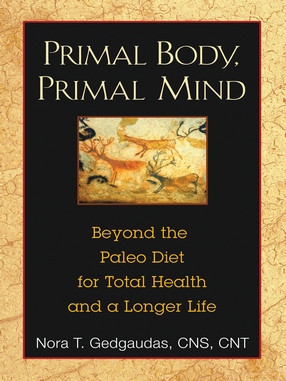My interest in health and wellbeing has stimulated a keen interest in uncovering credible sources of information, not only to increase my own knowledge and experience but also to pass on to clients and loved ones as a way of extending this knowledge.
I have already shared some of my favourite reference books on this blog such as my bible How to Eat, Move and Be Healthy by Paul Check and Nourishing Traditions by Sally Fallon.
Recently I have been reading a lot of books/articles written by people advocating the Paleo/Primal diet. The Paleolithic diet is basically a nutritional plan based on a diet our paleolithic ancestor would have presumably consumed some 2.5 million years ago. As you can imagine, the diet consists of mainly grass fed meats, seafood, vegetables and fruits and small amounts of nuts and seeds. Since the agricultural revolution is only 10,000 years old the diet excludes grains, legumes, dairy, refined sugar and anything that is processed.
There are some fantastic books outlining different interpretations of this concept such as The Primal Blueprint by Mark Sisson but so far none are as compelling and practical as Primal Body Primal Mind by Nora Geguadas. Not only will I be regularly using this a reference for my own daily health practices, but I will be recommending it to everyone I care about!!

Below is a summary from Amazon
Combining your body’s Paleolithic needs with modern nutritional and medical research for complete mind-body wellness
• Provides sustainable diet strategies to curb sugar cravings, promote fat burning and weight loss, reduce stress and anxiety, improve sleep and moods, increase energy and immunity, and enhance memory and brain function
• Shows how our modern diet leads to weight gain and “diseases of civilization”–such as cancer, osteoporosis, metabolic syndrome, heart disease, and ADD
• Explains how diet affects the brain, hormone balance, and the aging process and the crucial role of vitamin D in cancer and disease prevention
Examining the healthy lives of our pre-agricultural Paleolithic ancestors and the marked decline in stature, bone density, and dental health and the increase in birth defects, malnutrition, and disease following the implementation of the agricultural lifestyle, Nora Gedgaudas shows how our modern grain- and carbohydrate-heavy low-fat diets are a far cry from the high-fat, moderate-protein hunter-gatherer diets we are genetically programmed for, leading not only to lifelong weight gain but also to cravings, mood disorders, cognitive problems, and “diseases of civilization”–such as cancer, osteoporosis, metabolic syndrome (insulin resistance), heart disease, and mental illness.
Applying modern discoveries to the basic hunter-gatherer diet, she culls from vast research in evolutionary physiology, biochemistry, metabolism, nutrition, and chronic and degenerative disease to unveil a holistic lifestyle for true mind-body health and longevity. Revealing the primal origins and physiological basis for a high-fat, moderate-protein, starch-free diet and the importance of adequate omega-3 intake–critical to our brain and nervous system but sorely lacking in most people’s diets–she explains the nutritional problems of grains, gluten, soy, dairy, and starchy vegetables; which natural fats promote health and which (such as canola oil) harm it; the crucial role of vitamin D in cancer and disease prevention; the importance of saturated fat and cholesterol; and how diet affects mental health, memory, cognitive function, hormonal balance, and cellular aging. With step-by-step guidelines, recipes, and meal recommendations, this book offers sustainable strategies for a primally based, yet modern approach to diet and exercise to reduce stress and anxiety, lose weight, improve sleep and mood, increase energy and immunity, enhance brain function, save money on groceries, and live longer and happier.


Leave a Reply